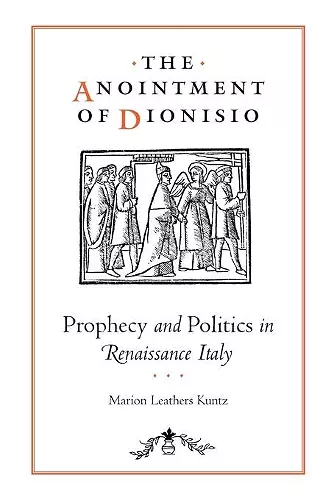The Anointment of Dionisio
Prophecy and Politics in Renaissance Italy
Format:Paperback
Publisher:Pennsylvania State University Press
Published:15th Sep '12
Currently unavailable, and unfortunately no date known when it will be back
This paperback is available in another edition too:
- Hardback£76.95(9780271021348)

In 1566 a flamboyant Frenchman who called himself Dionisio Gallo mesmerized crowds of onlookers as he preached in the courtyard of the ducal palace in Venice. Believing he had been anointed by the Virgin, he delivered a message of reform of church and society. Soon he was arrested, tried before the Inquisition, and banished. In The Anointment of Dionisio, Marion Leathers Kuntz tells the bizarre tale of this itinerant preacher, using his story to illuminate the checkered political and religious landscape of Counter-Reformation Europe.
No ragged John the Baptist, Dionisio preached in an elegant Latin, demonstrated a command of the intellectual tradition of prophetic writings, dressed so splendidly that many thought him a great prelate, and attracted the devotion of the king of France and a cluster of reform-minded princes and Venetian senators. So powerful was his call for reform that ecclesiastical authorities hesitated to arrest him and seemed confounded when they attempted to interrogate him. Kuntz recounts Dionisio's career with considerable aplomb, making a man who still remains mysterious in many ways come to life. In the end Kuntz gives us a richly layered depiction of the relationship between politics and religious reform during the decade of the Council of Trent. We learn how much prophecy and eschatology, especially when delivered by someone as persuasive, literate, and commanding as Dionisio, could still attract the intelligentsia of France and Italy.
“This exciting book explodes several widely held myths about the spiritual climate of Italy during the late sixteenth century. Kuntz makes it clear that the prophetic tradition remained a major force throughout the Cinquecento and that, outside the formal institutional structures of the church, there was widespread disillusionment with Trent. This well-crafted history brings the reader into the pleasures and challenges of historical detective work at its best.”
—John Martin, Trinity University
“This engaging book by Marion Leathers Kuntz presents her research into Dionisio’s fascinating life; her account of his time in Venice is particularly lively. But the great virtue of The Anointment of Dionisio is the way it uses the detail of its subject’s life to analyze the broader perspective of the intellectual and political climate of Counter-Reformation Italy.”
—Matthew Treherne Times Literary Supplement
“One could ask no more of any biography.”
—Matthew Treherne Times Literary Supplement
“This exciting book explodes several widely held myths about the spiritual climate of Italy during the late sixteenth century. . . . This well-crafted history brings the reader into the pleasures and challenges of historical detective work at its best.”
—Giustificativo
“We may never know whether Dionisio postponed the consummation of the age to a much later date and made the transition from ‘rooster’ to ‘owl,’ but Kuntz has shown how Dionisio’s prophecies appealed to many people in early modern Europe and she effectively contributes to recent work on the importance of prophetic discourses in the political, social, and religious history of the period.”
—Stephen Bowd American Historical Review
“Frequent drawing of parallels between Dionisio and W. Postel, subject of Kuntz’s earlier work, illuminates corners of the development of apocalyptic reform movements and thinking in the middle of the sixteenth century. A significant contribution.”
—Robert Kolb Religious Studies Review
“While Kuntz sometimes does not overtly recognize certain inconsistencies in Dionisio’s thought—for example he proclaimed his willingness to suffer for his mission, but spent his time in prison complaining endlessly about the tortures his fellow inmates visited upon him because of his constant preaching—overall the book is a striking analysis of the interrelated, and sometimes confusing, relationship between political and religious thought in sixteenth-century Europe.”
—Jane K. Wickersham Sixteenth Century Journal
“This book is a work of extensive scholarship and erudition, and a worthy successor of Marion Kuntz’s work on Postel. At its deepest level, it is an appreciation of the truth of the ‘myth of Venice.’”
—Ann Hartle Review of Metaphysics
“There is a wealth of erudition behind this book. A lot of connections have been made.”
—Thomas Kuehn Journal of Modern History
“She leaves us yet with the unexamined paradox that his fate was so different from that of the many men to whom she compares him.”
—Thomas Kuehn Journal of Modern History
“Marion Leathers Kuntz has expertly reconstructed this fascinating and hitherto unstudied story with patient archival research, historiographical breadth, and fine comparative readings of Dionisio's surviving works. Various themes come to the fore.”
—Christopher S. Celenza Catholic Historical Review
ISBN: 9780271058399
Dimensions: 229mm x 152mm x 33mm
Weight: 807g
464 pages